|
|
|
Sort Order |
|
|
|
Items / Page
|
|
|
|
|
|
|
| Srl | Item |
| 1 |
ID:
169885
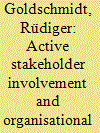

|
|
|
|
|
| Summary/Abstract |
Derived from a field research lab, this article contributes empirical results to the discussion on how communication and governance strategies can be effectively developed to promote the electrification of the taxi business (e-taxi business). The conceptual section indicates the relevance of this discussion. Based on multi-method research, a main finding is that, besides the relevant discussions on the technical aspects, organisational and social development tasks should be considered. Communication and governance strategies have to be flexibly adapted to the dynamics, uncertainties and especially heterogeneities raised by the specific settings. Thus active, deliberative and long-term stakeholder involvement based on an effective project network of capable organisations constitutes a central success factor and resource for developing a working e-taxi fleet in a conventionally orientated traffic environment. The article develops general and specific recommendations on how this can be designed and implemented. Based on empirical social research on attitudes and perceptions, for instance, existing user typologies will be elaborated upon. This supports the communication used for attracting entrepreneurs to participate in a planned developmental project and for involving entrepreneurs during the endeavour in his running stage. The article also presents organisational measures on how taxi companies coped with technical or infrastructural flaws.
|
|
|
|
|
|
|
|
|
|
|
|
|
|
|
|
| 2 |
ID:
066736
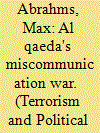

|
|
|
| 3 |
ID:
146577
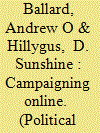

|
|
|
|
|
| Summary/Abstract |
Although much of what we know about political advertising comes from the study of television advertising alone, online advertising is an increasingly prominent part of political campaigning. Research on other online political communication—especially candidate websites, blogs, and social media—tends to conclude that these communications are aimed primarily at turning existing supporters into campaign donors, activists, and volunteers. Is a similar communication strategy found in online display ads—those ads placed adjacent to website content? In one of the first systematic analyses of the nature, content, and targets of online display advertising, we examined 840 unique online display ads from the 2012 presidential campaign. We show that the policy content, ad location, and interactive elements of the ads varied based on the audience, with persuasive appeals aimed at undecided or persuadable voters and engagement appeals aimed at existing supporters. Comparing ad content across candidates also found that each side focused on those issues for which the candidate had a strategic advantage. As a consequence, and in contrast to the conclusions of previous research that examines television advertising, we found minimal issue engagement in online advertising.
|
|
|
|
|
|
|
|
|
|
|
|
|
|
|
|
| 4 |
ID:
137251
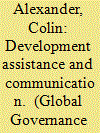

|
|
|
|
|
| Summary/Abstract |
This article argues that international development assistance projects are an ideal way for governments to communicate social values to international audiences and also to consolidate support or seek legitimacy from its domestic public. The case study for this article is the Taiwan International Cooperation and Development Fund. The text argues that this organization should sit at the forefront of the Taiwan government's communications strategy because of recent trends in political communications and also circumstances specific to Taiwan's domestic and international political situation. The research found that the ICDF has taken on more political communications responsibilities in recent years as a result of changes in Taiwan's international political circumstances and the evolution of a democratic society at home.
|
|
|
|
|
|
|
|
|
|
|
|
|
|
|
|
| 5 |
ID:
133256
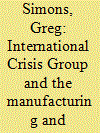

|
|
|
|
|
| Publication |
2014.
|
| Summary/Abstract |
The International Crisis Group (icg) has the motto 'working to prevent conflict worldwide'. As an organisation the icg occupies a very specific niche role, which is related to crises of a political nature, specifically armed conflict. While the icg employs a negative understanding of crisis, the academic definition of what a crisis may constitute is broader, as it can actually represent an opportunity for some actors. This article, written from a communication studies perspective, seeks to address how crises are manufactured in icg texts. It argues that the way in which crisis events are viewed and reacted to depends on the level of information and 'knowledge' that is produced and circulating about them. The article tackles the issue of the strategic level of the icg in terms of its means and mechanisms of attempting to project influence. It explores the different ploys and strategies used to influence policy makers, especially its communication strategy, the different values and ethics that are highlighted, and the 'causes' that are promoted.
|
|
|
|
|
|
|
|
|
|
|
|
|
|
|
|
| 6 |
ID:
126029


|
|
|
|
|
| Publication |
2012.
|
| Summary/Abstract |
In this article, we analyze feedback from simulated casualties who took part in field exercises involving mass decontamination, to gain an understanding of how responder communication can affect people's experiences of and compliance with decontamination. We analyzed questionnaire data gathered from 402 volunteers using the framework approach, to provide an insight into the public's experiences of decontamination and how these experiences are shaped by the actions of emergency responders. Factors that affected casualties' experiences of the decontamination process included the need for greater practical information and better communication from responders, and the need for privacy. Results support previous findings from small-scale incidents that involved decontamination in showing that participants wanted better communication from responders during the process of decontamination, including more practical information, and that the failure of responders to communicate effectively with members of the public led to anxiety about the decontamination process. The similarity between the findings from the exercises described in this article and previous research into real incidents involving decontamination suggests that field exercises provide a useful way to examine the effect of responder communication strategies on the public's experiences of decontamination. Future exercises should examine in more detail the effect of various communication strategies on the public's experiences of decontamination. This will facilitate the development of evidence-based communication strategies intended to reduce anxiety about decontamination and increase compliance among members of the public during real-life incidents that involve mass decontamination.
|
|
|
|
|
|
|
|
|
|
|
|
|
|
|
|
| 7 |
ID:
152650
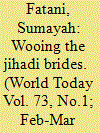

|
|
|
| 8 |
ID:
132398
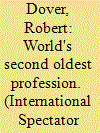

|
|
|
|
|
| Publication |
2014.
|
| Summary/Abstract |
The revelations from the former National Security Agency contractor, Edward Snowden, in July 2013 will have an enduring impact on the modern business of intelligence and the communication strategies of governments and non-state based adversaries alike. Snowden's revelations do not mark a fundamental divergence from the general understanding of intelligence. In making these implied understandings public, however, Snowden has changed the political dynamic around mass surveillance. The revelations amplify a tension within several layers of social contract from interactions between governments to those between governments and citizens. Long-term, diplomatic relations between the US and European governments should remain largely unaffected.
|
|
|
|
|
|
|
|
|
|
|
|
|
|
|
|
|
|
|
|
|